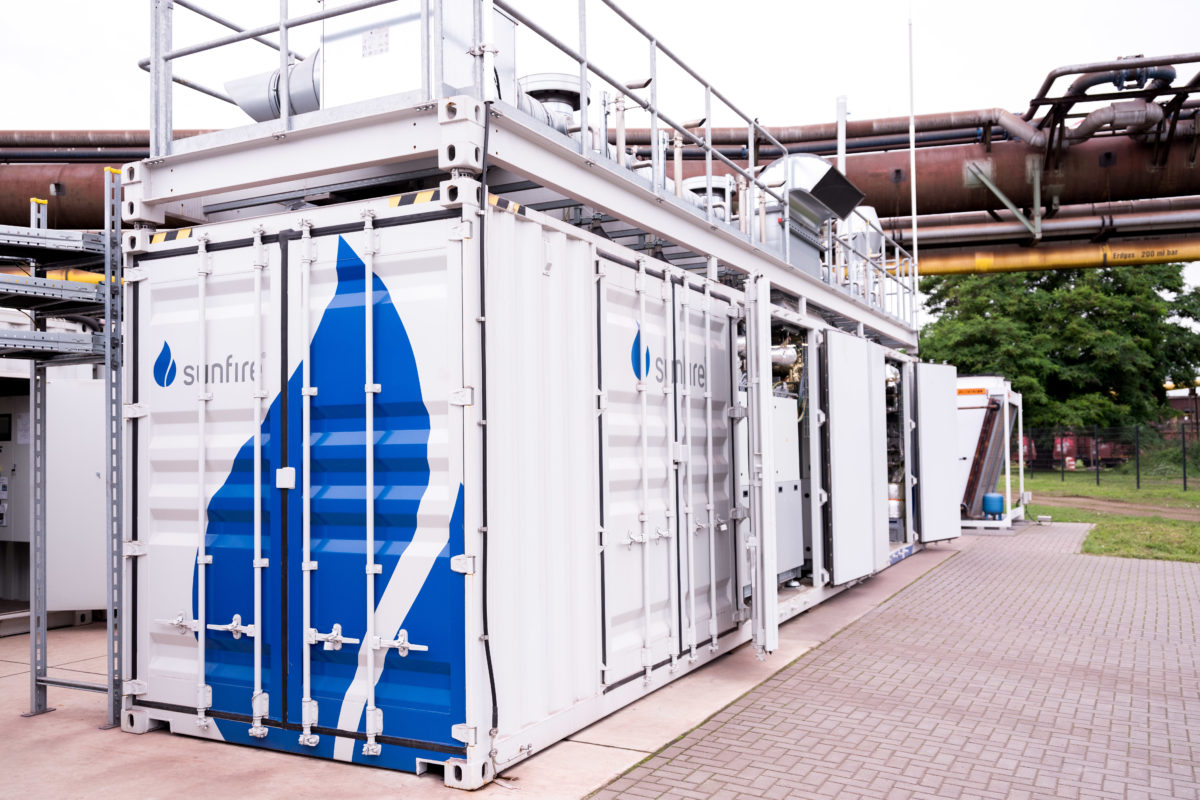Salzgitter has announced a record efficiency for its GrInHy2.0 hydrogen project, which is funded by the European Union. The German steel producer said the project has demonstrated “the world's largest high-temperature electrolyzer,” manufactured by German electrolysis specialist Sunfire. Based on solid oxide electrolysis cell (SOEC) technology, the electrolyzer runs at an operating temperature of 850 C and uses waste heat from Salzgitter's steel production processes. “For the first time, the electrolyzer produced 200 Nm3 of green hydrogen per hour. We are also able to prove an electrical efficiency of 84% el,LHV. This is a level of efficiency that no one else has achieved before. By comparison, other electrolysis technologies, such as Alkaline or PEM, only reach efficiencies of around 60% el,LHV,” said Simon Kroop, a project leader for Salzgitter Mannesmann Forschung.
Plug Power has signed an agreement with Walmart for an option to deliver up to 20 tons per day of liquid green hydrogen to power-material-handling lift trucks at Walmart warehouses across the United States. “This is one of the first green hydrogen supply contracts for Plug, validating the company's multi-year investment in its green hydrogen network,” US-based Plug Power said on Tuesday.
EDF has unveiled its new hydrogen strategy, with plans to develop 3 G.W. of electrolytic hydrogen projects throughout the world by 2030. “These projects, which will require between €2 billion ($2.2 billion) and €3 billion in investments, will be developed and co-financed within the framework of industrial partnerships and by benefiting from national and European support mechanisms,” said the French energy company.
Total Eren has awarded a conceptual engineering contract to Wood for a large-scale green hydrogen production facility in southern Chile. “The engineering package will include up to 10 GW of installed wind capacity, coupled with up to 8 GW of electrolysis capacity, a desalination plant, an ammonia (NH3) plant, power transmission and backup, and port facilities to transport the green ammonia to national and international markets,” Wood said last week. The H2 Magallanes Project is part of Chile's plans to develop 25 GW of electrolysis capacity by 2030, based on solar and wind resources.
European Commission Vice-President Frans Timmermans met with the Egyptian government last week in Cairo to discuss a renewed energy collaboration, including the Mediterranean Green Hydrogen Partnership and cooperation on LNG supplies. “We agreed to move fast to expand cooperation on climate action and the clean energy transition,” said Timmermans. The Mediterranean Green Hydrogen Partnership involves hydrogen trading between Europe, Africa and the Middle East. European institutions want to invest in “large-scale rollout of renewables,” said Timmermans.
Italian Prime Minister Mario Draghi recently traveled to Algeria to sign a bilateral energy cooperation plan between the two countries, primarily focused on gas. “Italy is ready to work with Algeria to develop renewable energy and green hydrogen,” Draghi reportedly said.
Popular content
Transgaz has agreed to share best practices and identify hydrogen markets with GAZ-SYSTEM of Poland, EUSTREAM of Slovakia, and FGSZ of Hungary. The Romanian natural gas transmission system operator said that the group will also draft a relevant regulatory framework and prepare a feasibility study, with plans to explore the decarbonization of their operations and the transport of green gases.
Scania has started working on a project to develop an initial set of 20 fuel cell electric trucks that will run on green hydrogen, in cooperation with Cummins. The Swedish automotive manufacturer said on its website that the 20 trucks will be delivered to HyTrucks in 2024, “once Cummins has added fuel cells” to them. HyTrucks is a joint initiative in the Netherlands between Air Liquide and the Port of Rotterdam Authority.
Cummins has also announced a contract to supply a 2.5 MW electrolyzer to Hysetco, a hydrogen mobility company owned by Total Energies, Air Liquide, and Toyota. The electrolyzer will enable local hydrogen production to power a Hysetco project in Paris. Indiana-based Cummins said the plan is to develop and operate the “world's first large-scale hydrogen mobility platform,” starting with “the largest hydrogen taxi fleet worldwide.”
Cornell University and two Cornell research startups have joined a consortium that aims to propose a northeastern US research hub for hydrogen. With approximately $9.6 billion available in federal funding, the US Department of Energy is expected to start requesting proposals in early May for regional hydrogen centers, including research and demonstration projects. The group plans to apply for a portion of that federal funding, Cornell University said. Other New York universities that are participating in the consortium include Columbia University, Rochester Institute of Technology, New York University, Stony Brook University (SUNY), City College of New York, and University at Buffalo (SUNY). The New York-led consortium includes the states of Connecticut, Massachusetts and New Jersey.
This content is protected by copyright and may not be reused. If you want to cooperate with us and would like to reuse some of our content, please contact: editors@pv-magazine.com.

By submitting this form you agree to pv magazine using your data for the purposes of publishing your comment.
Your personal data will only be disclosed or otherwise transmitted to third parties for the purposes of spam filtering or if this is necessary for technical maintenance of the website. Any other transfer to third parties will not take place unless this is justified on the basis of applicable data protection regulations or if pv magazine is legally obliged to do so.
You may revoke this consent at any time with effect for the future, in which case your personal data will be deleted immediately. Otherwise, your data will be deleted if pv magazine has processed your request or the purpose of data storage is fulfilled.
Further information on data privacy can be found in our Data Protection Policy.